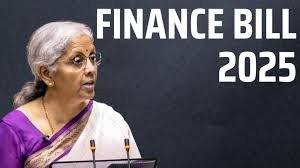Introduction
The Lok Sabha recently passed the Finance Bill 2025, a crucial legislative measure that determines the government’s taxation policies and financial regulations for the upcoming fiscal year. This bill plays a pivotal role in shaping the country’s economy, affecting taxpayers, businesses, and financial institutions alike.
Major Taxation Changes Introduced
The Finance Bill 2025 brings significant modifications to direct and indirect taxation. Some of the key changes include:
- Revised Income Tax Slabs: The government has introduced adjustments to tax brackets, benefiting middle-class taxpayers.
- Corporate Tax Revisions: Certain relaxations have been provided to startups and MSMEs, fostering business growth.
- GST and Indirect Tax Amendments: Changes in GST rates on essential commodities and services aim to boost economic activity.
Impact on Different Sectors
Various industries will experience the effects of the Finance Bill 2025 in different ways:
- Banking & Finance: Revised capital gains tax regulations could impact investments and financial planning.
- Real Estate: New provisions on property taxation may influence the housing market.
- Agriculture & Rural Development: Special allocations have been made to support farmers and rural development projects.
Fiscal Deficit and Budgetary Allocations
The Finance Bill outlines measures to manage the fiscal deficit while ensuring adequate funding for crucial sectors such as:
- Infrastructure Development – Increased investment in roads, railways, and digital connectivity.
- Social Welfare Programs – Enhanced allocations for healthcare, education, and poverty alleviation schemes.
- Defense & National Security – Strengthened budget provisions for defense modernization and border security.
Government’s Rationale Behind the Bill
The passage of the Finance Bill 2025 aligns with the government’s objective of promoting economic growth while maintaining fiscal discipline. Key motivations include:
- Strengthening India’s position as a global investment hub.
- Enhancing ease of doing business through tax simplifications.
- Boosting employment opportunities via sector-specific incentives.

Why This News is Important
Economic Implications
The Finance Bill dictates the financial trajectory of the country, influencing GDP growth, employment, and inflation rates. Understanding its provisions is crucial for students preparing for competitive exams.
Impact on Common Citizens
With changes in taxation and social welfare schemes, the Finance Bill directly affects taxpayers, investors, and businesses. Knowledge of these updates is essential for aspirants of government exams in banking, civil services, and finance sectors.
Relevance for Government Exam Preparation
The Finance Bill covers topics relevant to banking, public policy, taxation, and governance, making it an important subject for exams such as UPSC, SSC, RBI Grade B, and banking sector tests.
Historical Context
Evolution of Finance Bills in India
The Finance Bill is an annual legislative measure introduced along with the Union Budget. It outlines tax proposals and economic policies for the financial year ahead.
Key Finance Bills in the Past
- Finance Bill 1991: Marked India’s economic liberalization with major reforms.
- Finance Bill 2016: Introduced the Goods and Services Tax (GST), transforming the indirect tax system.
- Finance Bill 2020: Implemented major direct tax reforms under the new income tax regime.
Role of Parliament in Passing the Finance Bill
The Finance Bill must be passed by both Houses of Parliament before becoming law. The Lok Sabha holds primary authority in approving financial legislations, while the Rajya Sabha can suggest amendments but not reject the bill.
Key Takeaways from Finance Bill 2025
| S.No | Key Takeaway |
|---|---|
| 1 | Lok Sabha passed the Finance Bill 2025, outlining taxation and economic policies for the fiscal year. |
| 2 | New income tax slabs introduced, benefiting middle-class taxpayers. |
| 3 | Corporate tax relaxations provided to startups and MSMEs to boost economic growth. |
| 4 | Increased allocations for infrastructure, healthcare, and defense sectors. |
| 5 | The bill aligns with India’s long-term financial goals and economic stability. |
FAQs: Frequently Asked Questions
1. What is the Finance Bill?
The Finance Bill is a legislative proposal introduced by the government along with the Union Budget to implement tax changes and financial policies for the upcoming fiscal year.
2. How does the Finance Bill affect taxpayers?
The bill introduces new tax slabs, deductions, and exemptions, which directly impact individual taxpayers and businesses.
3. What are the key highlights of the Finance Bill 2025?
Key highlights include revised income tax slabs, corporate tax relaxations, and increased budget allocations for infrastructure and social welfare.
4. How is the Finance Bill passed in India?
The bill is first introduced in the Lok Sabha, where it is debated and voted upon. It then moves to the Rajya Sabha for recommendations before receiving the President’s assent.
5. Why is the Finance Bill important for government exam aspirants?
It covers crucial topics related to taxation, economy, governance, and policy-making, which are frequently asked in banking, civil services, and finance-related exams.
Some Important Current Affairs Links


